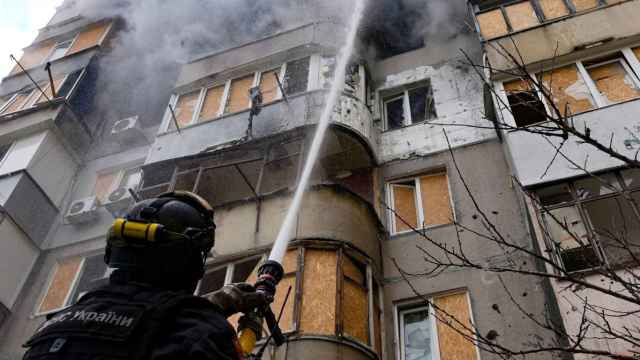The MT Conferences section did not involve the reporting or the editorial staff of The Moscow Times.

Yuri Vorobyev
Head of Dispute Resolution
and Mediation Practice, Attorney
Pepeliaev Group
Note: We have analyzed court and administrative decisions regarding the procedure for determining the amount of a penalty and for recovering it. We have offered recommendations to the parties to a construction contract in terms of safeguarding their position.
Court practice over recent years shows that claims to recover a penalty have become one of the most commonly applied judicial methods for protecting rights under a construction contract.
As a rule, customers' claims to recover a penalty are tied to the failure to meet deadlines for work to be performed (for specific stages to be started or finished), for security to be provided for obligations under contracts, or for source accounting documentation to be handed over. Contractors' claims in the main relate to late payment for the work that has been done (including a delay in making advance payments that the contract provides for).
Often, claims to recover a penalty are examined as counterclaims and, in the majority of cases, customers' claims to recover a penalty are counterclaims that follow on from contractors seeking to recover amounts owed for work that has been done (the Resolutions of the Federal Commercial Court (FCC) for the Moscow Circuit dated 13 Dec. 13, 2013 in case No. А56-77462/2012, of the FCC for the Moscow Circuit dated Dec. 4, 2013 in case No. А40-115415/12-151-884, of the Eighth Commercial Appeal Court dated April 15, 2013 in case No. А70-9096/2012, and the First Commercial Appeal Court dated Nov. 2, 2010 in case No. А43-6583/2010).

Ekaterina Lebedeva
Senior Associate
Pepeliaev Group
An analysis of the case law that has evolved points to the conclusion that courts are more willing to apply a penalty as a measure of liability when the parties to a construction contract fail to perform or do not properly perform their obligations (Ruling No. VAS-18861/13 of the Russian Supreme Commercial Court (SCC) dated Dec. 25, 2013; Resolutions of the FCC for the Northwest Circuit dated Jan. 16, 2014 in case No. А56-8391/2013, the FCC for the Moscow Circuit dated Oct. 29, 2013 in case No. А40-131084/12-14-1189, and FCC for the Moscow Circuit dated Oct. 29, 2012 in case No. А40-6345/12-52-57).
In addition, it should be noted that the courts have started to be guided by the principle of freedom of contract to a much lesser degree (if the parties agreed a particular procedure for calculating whether a penalty was charged and the amount of the penalty, then how much the penalty is should be calculated according to the agreed procedure and amount). Now the courts are fairly active in using article 333 of the Russian Civil Code as grounds for reducing the amount of the penalty.
In determining the amount of a penalty that should be recovered, the courts are guided in particular by the clarifications contained Resolution No. 81 of the Plenum of the SCC 'On certain issues of applying article 333 of the Russian Civil Code' (the "Plenum's Resolution No. 81"), SCC's Information Letter No. 51 dated Jan. 24, 2000 'An overview of practice in resolving disputes under construction contracts', and Resolution No. 6/8 of the Plenum of the Russian Supreme Court and the SCC dated July 1, 1996 'On certain issues connected with the application of the first part of the Russian Civil Code' (see Resolutions of the Presidium of the SCC No. 1488/13 dated July 9, 2013, of the FCC for the Northwest Circuit dated 13 December 2013 in case No. А56-77462/2012, of the FCC dated May 30, 2013 in case No. А40-122000/12-25-571, and of the Eighth Commercial Appeal Court dated Oct. 3, 2013 in case No. А70-3686/2013).
It is important to be aware that, under clause 1 of the Plenum's Resolution No. 81, it is presumed that a penalty is commensurate with the consequences of the obligation being breached. To this end, firstly it is possible to reduce the amount of the penalty only further to an application from the interested party, and secondly, only if the party in question provided evidence that the penalty claimed is not commensurate with the consequences of the breach.
Criteria for establishing that a penalty is not commensurate in a specific case can include: the fact that interest rate for the penalty is excessively high; the fact that the penalty is significantly in excess of the amount of the losses caused by the breach of the obligations; and the duration for which the obligation is not performed.
When they award a penalty, courts take into account the fault of the creditor (a delay by the creditor), or any reciprocal non-performance by the creditor of its obligations (Resolutions of the FCC for the Moscow Circuit dated June 24, 2013 in case No. А40-107847/12-14-964, of the Eighth Commercial Appeal Court dated Dec. 24, 2013 in case No. А70-6728/2013, and of the Eighth Commercial Appeal Court dated Oct. 3, 2013 in case No. А70-3686/2013).
Under clause 10 of Resolution No. 81 of the Plenum of the SCC dated Dec. 22, 2011, if an obligation was not performed or was improperly performed through the fault of both parties, or if a creditor intentionally or negligently increased the amount of the penalty, a court may reduce the measure of the debtor's liability. However, this will be under article 404 of the Civil Code and not article 333 of the Civil Code.
According to the explanations set out in clause 17 of the SCC's Information Letter No. 51 dated Jan. 24, 2000 'An overview of practice in resolving disputes under construction contracts', if a party to a construction contract fails to perform an obligation to work together this may be taken into account when determining the measure of liability for failure to meet a contractual obligation.
In accordance with the SCC's legal position set out in Resolution No. 81 (referred to above), the court, in resolving a matter that related to the application of article 333 of the Russian Civil Code, was obliged to find a balance between the measure of liability applied to the party in breach and assessing the amount of harm caused as a result of the breach in question. When assessing the amount that is sufficient to compensate a creditor's loss, the courts are guided by the principle of restoring the creditor's sphere of property, and do not attempt to unjustly enrich the creditor at the debtor's expense. Often, courts apply double the interest rate of the Russian Central Bank that was in existence when the monetary obligation was breached.
Thus, a party presenting a claim to recover a penalty needs, if it wishes to avoid seeing the amount of the penalty reduced, to present evidence of the fact that the level of the penalty corresponds to or is not significantly in excess of the harm the applicant has suffered. A party which has such a claim to recover a penalty made against it will have to show that the penalty is disproportionate to the consequences of the breach of the contractual obligation.
The MT Conferences section did not involve the reporting or the editorial staff of The Moscow Times.
A Message from The Moscow Times:
Dear readers,
We are facing unprecedented challenges. Russia's Prosecutor General's Office has designated The Moscow Times as an "undesirable" organization, criminalizing our work and putting our staff at risk of prosecution. This follows our earlier unjust labeling as a "foreign agent."
These actions are direct attempts to silence independent journalism in Russia. The authorities claim our work "discredits the decisions of the Russian leadership." We see things differently: we strive to provide accurate, unbiased reporting on Russia.
We, the journalists of The Moscow Times, refuse to be silenced. But to continue our work, we need your help.
Your support, no matter how small, makes a world of difference. If you can, please support us monthly starting from just $2. It's quick to set up, and every contribution makes a significant impact.
By supporting The Moscow Times, you're defending open, independent journalism in the face of repression. Thank you for standing with us.
Remind me later.





